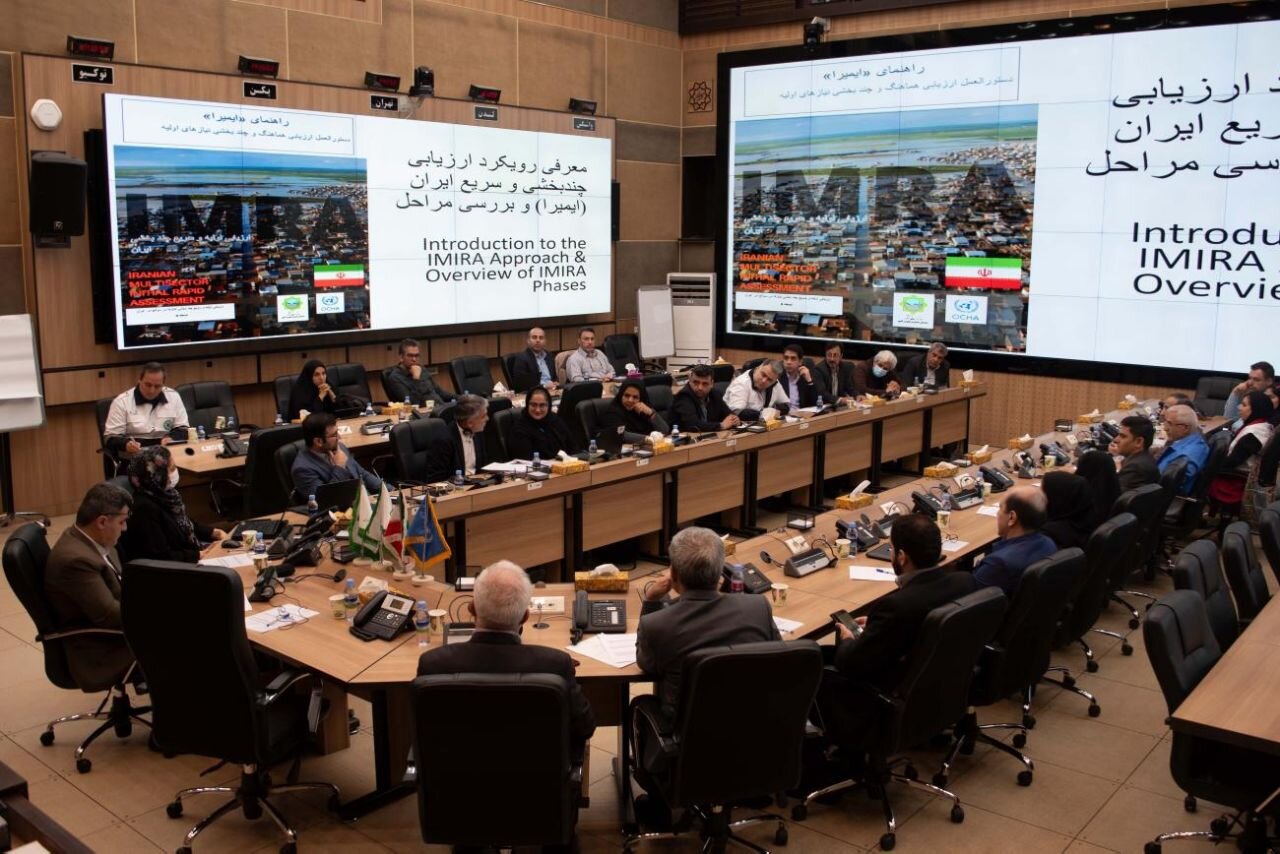Technical workshop held to introduce IMIRA

TEHRAN – The National Disaster Management Organization (NDMO) in coordination with the Ministry of Foreign Affairs and the United Nations Office for the Coordination of Humanitarian Affairs (UNOCHA), held a technical workshop focusing on the introduction of the new Iranian Multi-sectoral Initial Rapid Assessment (IMIRA).
The two-day workshop was held on April 23 and 24 at the Tehran Disaster Mitigation and Management Organization (TDMMO) in response to the pressing need for improved coordination and strategic planning in disaster response efforts, the UN Website announced in a press release on May 1.
The IMIRA tool aims to establish a well-defined, coordinated, standardized countrywide approach to multi-sectoral needs assessment following disasters.
"Any coordinated response can be effective and efficient with a collective needs assessment," stated the UN Resident Coordinator, Stefan Priesner, emphasizing that a collective needs assessment using reliable data and analysis is crucial for an effective and efficient response.
"IMIRA will help identify the most pressing needs of disaster-affected populations across various sectors, streamline strategic planning, and optimize resource allocation,” he added.
Over 60 representatives from key government entities involved in disaster management attended the workshop, facilitated by a resource person from UNOCHA Geneva. The event served as a platform for dynamic discussions, exchange of practical exercises, and in-depth exploration of multi-sectoral needs assessment methodologies.
Participants were introduced to the IMIRA phases, from data collection to interactive dashboards, reporting, and interpreting assessment results.
A pilot implementation of IMIRA will be conducted in seven provinces including Chaharmahal–Bakhtiari, Golestan, Hormozgan, Isfahan, Qom, Qazvin, and Mazandaran.
This pilot phase aims to evaluate IMIRA across diverse disaster contexts, shedding lights on its efficacy in real situations, and laying the groundwork for national rollout.
Government representatives have underscored the importance of standardized multisectoral needs assessments like IMIRA in elevating coordinated response efforts.
The event marked a significant step forward in fortifying the analytical framework that guides the systematic collection and analysis of information on affected people and their needs to inform strategic planning in disaster response.
Iran, OCHA to boost cooperation
On January 26, the UNOCHA and the NDMO conferred on ways to enhance cooperation in dealing with emergencies, providing rapid response to incidents, and taking humanitarian measures.
Birgit Velte, the OCHA humanitarian affairs officer for the Middle East and North Africa (MENA) region, and Nejad Jahani, the NDMO deputy director for reconstruction and rehabilitation affairs, met in Tehran on Sunday, January 21.
Referring to the positive relations between the Islamic Republic of Iran and the United Nations, especially the Regional Office of OCHA, Velte said the office is trying to overcome its weaknesses and have a road map for emergency situations, IRNA reported.
She added that the OCHA office's main responsibility is to coordinate the entry of foreign forces and facilities during emergencies, at the request of the affected country’s government.
“We want to develop a preparedness plan based on international and the Islamic Republic of Iran’s laws to provide rapid response to incidents,” Velte said. Developing such a plan requires more cooperation and talks, she added.
“According to United Nations Resolution 2665, all humanitarian aid programs are exempt from any sanctions, and American sanctions cannot stop banking operations and the provision of equipment in times of emergency,” IRNA quoted Velte as saying.
She went on to add, “We are ready to cooperate for the joint implementation of the program to remove international sanctions in crisis conditions, taking into account national and international capacities.”
Jahani, for his part, said that the humanitarian activities of Iran have nothing to do with political issues.
On the contrary, certain countries delay the delivery of humanitarian aid, even from Iranians to other countries by imposing cruel sanctions, he stressed.
Crisis Management Organization is a coordinating organization the same as OCHA, and according to the organization's rules, the whole goals, duties, and tasks are foreseen for crisis management in emergencies, he highlighted.
Jahani expressed hope that the development of cooperation along with the exchange of experiences and knowledge and cooperation in the programs of INSARAG (International Search and Rescue Advisory Group) and MIRA will reduce the problems after the accidents and meet the needs of the victims.
INSARAG, Russian EMERCOM assessment
The Iranian Red Crescent Society (IRCS) and Tehran Fire Department have been assessed by the International Search and Rescue Advisory Group (INSARAG) and Emergency Situations and Elimination of Consequences of Natural Disasters of the Russian Federation (EMERCOM).
The initial assessment mission was held from March 9 to 14 to achieve international classification according to the INSARAG standards.
Capacity building is at the heart of INSARAG and the EMERCOM of the Russian Federation, as a member of the INSARAG network, agreed to provide its technical expertise to support this initiative, UN Website announced in a press release on March 19.
Throughout the week-long mission, INSARAG and EMERCOM representatives met with Iranian officials and visited the Relief and Rescue Center of IRCS and Training Center of Tehran Fire Department.
The mission was initiated in response to a request from Iran’s Ministry of Foreign Affairs and was facilitated by the Tehran Disaster Mitigation and Management Organization (TDMMO) on behalf of the National Disaster Management Organization (NDMO).
This mission established a roadmap for the remaining steps ahead of the completion of the classification process.
MT/MG
Leave a Comment